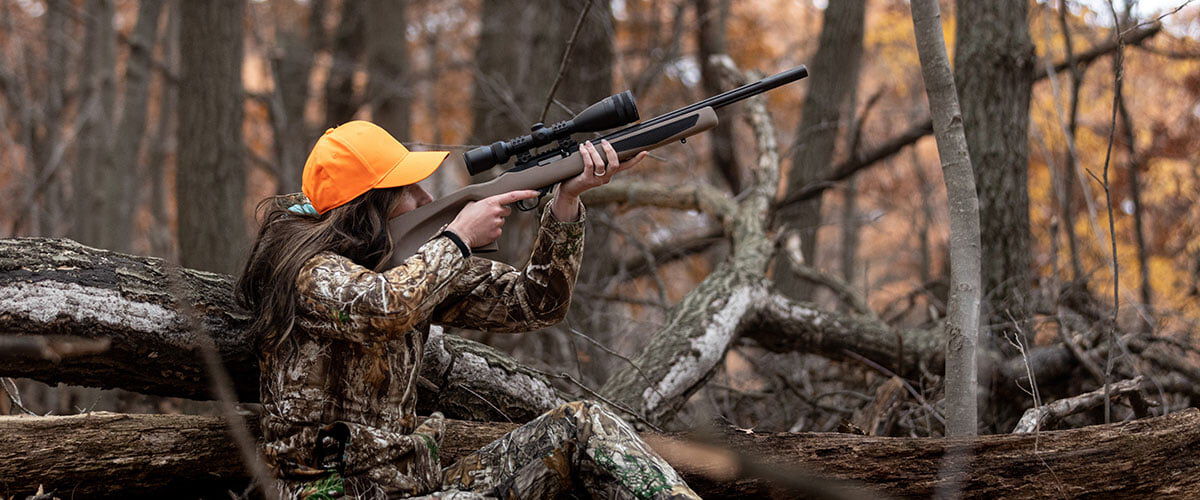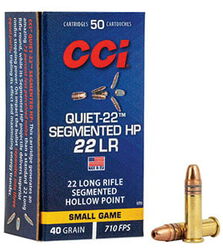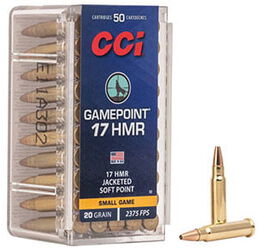
A generation or two ago, most new hunters spent much of their time sniping squirrels, jumping rabbits or maybe pass-shooting doves. Sure, they were probably also introduced to deer and turkeys, but small game likely dominated their earliest hunts. And although it probably wasn’t the conscious intent, those seemingly simpler pursuits became the backbone for many future hunting endeavors, because small game hunting builds skills that make you a better big game hunter.
We’ve outlined the three fundamental skills small game hunts foster that ultimately translate to all other forms of hunting.
Skill 1: Woodsmanship
Small game hunting provides endless instruction on the field skills that comprise woodsmanship. Those who spend mornings huddled on an open oak ridge learn quickly how to detect game. Attempting to reposition on a squirrel in a hickory tree or a cottontail sitting motionless by a creek bottom teaches hunters about stealth and reading terrain.
Sub-Sonic HP
Clocking in at sub-sonic velocities, this load creates less noise, yet its bullet expands reliably for quick kills on a variety of small game.
Buy Now
And although small game hunting typically produces more consistent action than big game pursuits, new squirrel, rabbit and varmint hunters also realize the importance of patience and persistence. Those lessons and more become parts of the skill sets that later let hunters slip through the woods to set up on a gobbler, pull off a spot-and-stalk on a bedded mule deer or slowly turn and shoot a big whitetail.
Skill 2: Shooting Positions
The shooting lessons offered by small game are equally if not more important. Remember the first time you shot a big game rifle or a 12 gauge stuffed with heavy game loads? Most folks remember the pounding recoil, which for many becomes the No. 1 roadblock when learning how to shoot well. Newcomers—especially physically smaller ones—simply cannot focus on solid shooting fundamentals when they’re flinching or worrying about being mule-kicked. Conversely, many small game pursuits allow ample shooting lessons without the worry of bludgeoning recoil.
Quiet-22 Segmented HP
Generate 75 percent less perceived noise than a standard velocity 22 Long Rifle round. However, its Segmented HP bullet splits in three on impact, with each section creating its own distinct wound channel to bring down small game fast.
Buy Now
New squirrel and rabbit hunters learn from consistent low-recoil repetition how to mount, hold and steady their guns. They can focus on proper breathing technique and learning to squeeze instead of jerk the trigger. And they develop skills shooting from various positions—prone, kneeling or standing, for example—and learn the value of having a solid shooting rest. Those lessons last a lifetime, and hunters will use them time and again when settling a red dot on a turkey or calmly sending a bullet downrange at a distant elk or whitetail.
Skill 3: Beyond The Field
In addition, the school of small game teaches new hunters the basics of sportsmanship, ethics and proper game care. Cleaning a mess of squirrels might differ from field-dressing a buck, but it gives neophytes basic instruction on prepping game for the table.
Gamepoint
Built to offer controlled expansion like a big game bullet, CCI Gamepoint drives deep penetration on the full spectrum of small game species.
Buy Now
Above all, perhaps, small game hunting is pure fun, with little of the pressure or competition sometimes inherent in big game pursuits. Mornings in the squirrel woods or afternoons kicking brushpiles for rabbits build a serious love for outdoors pursuits. And even as newcomers grow and transition into serious, skilled turkey, whitetail and big game hunters, they never forget the simple enjoyment produced by small game hunting.
Small-game hunting need not be exclusive. Absolutely introduce newcomers to waterfowling, turkey season and deer hunting. But remember that small game pursuits can offer them a great introduction and education to hunting in general while letting them hone woods skills in a lower-pressure, light-hearted environment. They won’t regret a minute spent chasing small game. And when their big game graduation arrives, they’ll have a toolbox full of skills for success.